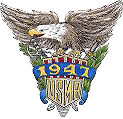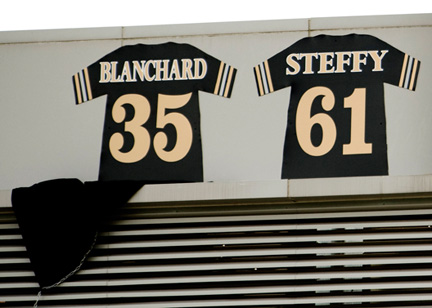An Inside Honor
Courtesy: Army Athletic Communications
This feature originally appeared in the Oct. 10 issue of Army Football Game Day vs. Vanderbilt.
The Army Athletic Association honors one of its greatest sons when it retires three-time All-American and Heisman Trophy winner Doc Blanchard's #35 jersey today at halftime.
Were it not for a turn of fate, Blanchard might never have played at Army had he been able to enlist in Navy's V-12 program, which allowed students to complete their education in return for a service commitment, following his freshman year at the University of North Carolina. Instead he was rejected because he was considered overweight and had a vision problem.
Blanchard changed directions, enlisting in the Army in 1943 and was stationed in New Mexico with a chemical-warfare unit before securing an appointment to West Point in July 1944. The kid that Navy rejected, and who went on to become one of the finest athletes in the nation, would haunt the U.S. Naval Academy for three long years.
Blanchard was a punishing player whose ability to run, block, punt and catch put fear into his opponents. He helped spearhead, along with Glenn Davis, one of the most formidable offensive attacks in Army football history (three consecutive national championships in compiling a 27-0-1 mark between 1944-46) as part of one of the most famous backfields in college football history .
He was dubbed "Mr. Inside" to Davis' "Mr. Outside" by columnist George Trevor of the New York Sun who was inspired watching Blanchard busting up the middle and Davis outrunning defenders down the sidelines. Together they combined for 97 touchdowns and 585 points as the "Touchdown Twins" ruled college football during the mid-1940s.
But even more importantly, they gave the nation sports heroes during a time when the United States was embroiled in World War II.
Army legendary coach Earl Blaik had the following comments about Blanchard in his memoir, "You Have to Pay the Price."
"Doc Blanchard was the best-built athlete I ever saw: six feet and 208 pounds at his peak, not a suspicion of fat on him, with slim waist, Atlas shoulders, and colossal legs.
"For a big man, Doc was the quickest starter I ever saw, and in the open he ran with the niftiness as well as the speed of a great halfback. He was a terrific tackler and blocker. He could catch passes, punt and kick off exceptionally well. Twice in Navy games, I saw him run through a head-on tackle without breaking stride and race on to a touchdown. He had great instinctive football sense, supreme confidence and deep pride."
In a 59-0 rout of Notre Dame in 1944, Blanchard dislocated the elbow and wrenched the knee of head linesman, Dr. David Reese, with an inadvertent hit. After the game, Notre Dame coach Ed McKeever was quoted as saying: "I've just seen Superman in the flesh. He wears No. 35 and he goes by the name of Blanchard."
When Army ruled the world of football, it came at a time when many of the best football players were off to war, but it didn't diminish what the Black Knights accomplished on the gridiron.
Prior to the Blanchard and Davis era, Army had lost five straight games to Navy. That changed on Dec. 2, 1944 in Baltimore's Municipal Stadium (the game was moved to Maryland on orders of President Franklin Roosevelt to accommodate a large crowd). Fans were also required to purchase war bonds with their tickets; and the game was the largest homeland fundraising effort during the war.
"We came into the game and it seemed like the whole country was either in the Army or Navy or knew and cared about someone who was," Blanchard is quoted as saying to Bill Pennington in his book "The Heisman."
"It was one of the times when a game just felt like more than a game." Blanchard answered the call with six consecutive carries, capped by a 10-yard touchdown run, to boost Army's slim 9-7 lead heading into the fourth quarter into a 16-7 advantage.
Following unbeaten Army's (9-0) 23-7 defeat of the Midshipmen for the national championship, Blaik received a telegram from Gen. Douglas MacArthur which read: "The greatest of all Army teams ... We have stopped the war to celebrate your magnificent success. MacArthur."
That year Blanchard finished third in the Heisman voting behind Ohio State's Les Horvath and Davis.
As the football team prepared for the 1945 season, victory had been declared in the Pacific, soldiers were returning from Europe and the United States was celebrating the end of almost four years of global conflict.
Army (9-0) blanked five of its opponents that year, including a 48-0 romp over Notre Dame, then put the finishing touches on what many consider the finest season in college history after beating Navy once again for the national championship. Blanchard scored three touchdowns and Davis two in a 32-13 decision.
The honors poured in for Blanchard, who led the nation in total scoring, that year as he became the first college junior to win the Heisman Trophy as the nation's outstanding player with Davis finishing runner-up in the voting. Blanchard received the Maxwell Cup and Walter Camp Trophy as college football's outstanding player and was the first football player to win the Sullivan Award as the outstanding amateur athlete in America.
Army's bid to capture a third straight national championship received a blow when Blanchard suffered a knee injury in the first game of the 1946 campaign. Diagnosed as a torn ACL, it only sidelined him for a few games. He made his presence felt in his return against No. 4 Michigan in Ann Arbor by scoring the game-winning touchdown in sparking No. 2 Army to a 20-13 victory.
The biggest game of the season was the showdown with No. 1 Notre Dame at Yankee Stadium with over 74,000 fans in attendance. The game ended in a 0-0 tie following a defensive battle as Army allowed the Irish past midfield just three times and only once inside the Black Knights' 10-yard line.
Blanchard had Army's best chance to score but was tackled in the open field by future Heisman Trophy winner John Lujack at the Irish 37. That year Notre Dame was named national champions in five polls with Army claiming top honors in two others along with three co-champion listings.
In the final collegiate game for the Touchdown Twins, Army (9-0-1) held off Navy's rally in a 21-18 edging for their third straight win over the Midshipmen while closing out one of the finest periods in football history.
Blanchard, who went on to retire as a Colonel from the Air Force after flying fighter jets during the Korean and Vietnam wars, passed away at the age of 84 in April. The National Football Hall of Fame inductee has left a legacy on the gridiron that may never be equaled as the game he played is different today with pro sets and wingmen replacing the days of the powerful fullback.
His legacy lives on at Michie Stadium as he becomes just the fourth player in Army's storied history to have his number retired, joining former teammates Davis (41) and Joe Steffy (61) along with Heisman running back Pete Dawkins (24).
Mady Salvani is an Assistant Director of Athletic Communications at West Point.



